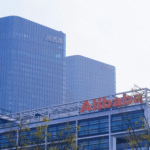Nokia’s CEO Justin Hotard believes that artificial intelligence (AI) is at the start of a major growth phase similar to the internet revolution of the 1990s. While many fear an investment bubble, he remains confident that AI’s long-term potential will bring positive change across industries and create lasting opportunities.
The world of technology is changing faster than ever, and at the center of it all stands artificial intelligence. Every major company today is talking about AI — how it can make work easier, speed up innovation, and transform industries. Nokia’s Chief Executive Officer, Justin Hotard, recently shared his thoughts on this fast-growing trend. According to him, what we are witnessing now with AI is very similar to what the world experienced in the 1990s when the internet first began to reshape our lives.
Hotard said in an interview, “I fundamentally think we’re at the front end of an AI supercycle, much like the 1990s with the internet. Even if there’s a bubble, a trough, we’ll look to the longer-term trends. And right now, all those trends are very favourable.” His words show optimism and belief that AI is not just another passing trend — it’s a technological revolution that will define the next decade.
However, as with every big change, there are mixed opinions. Many experts are worried that the excitement surrounding AI might be leading to a financial bubble — meaning, companies and investors might be putting too much money into AI projects without fully understanding how sustainable they are. A recent Bank of America survey showed that more than half of fund managers believe AI-related stocks are already in a bubble. This means they think AI’s popularity may have grown too fast, and if expectations aren’t met, the value of these investments could crash suddenly.

Even some of the biggest names in technology have shared their concerns. Amazon founder Jeff Bezos and OpenAI CEO Sam Altman have both warned that the hype around AI might cause investors to lose large sums of money if the market overheats. But despite these warnings, the interest in AI keeps growing, and companies continue to spend heavily on technologies that depend on it.
For Nokia’s CEO, these short-term fears do not change the bigger picture. Hotard believes AI will continue to expand and bring long-term progress, even if the journey has a few ups and downs along the way. This perspective reminds many of how the internet evolved. During the 1990s, people rushed to invest in internet-based companies, many of which failed. Yet, even after the dot-com bubble burst, the internet remained a powerful force that transformed the way people live, work, and connect. Similarly, Hotard suggests that AI might also face some challenges initially, but its long-term impact will be revolutionary.
Hotard’s background gives him a strong understanding of this field. Before joining Nokia in April, he worked at Intel, where he led the company’s data center and AI group. That experience gave him a front-row seat to the rise of AI technologies and how companies are preparing to handle the huge amounts of data needed to make AI work efficiently. Now at Nokia, he continues to see similar patterns of growth.
He explained that the biggest driver of this AI wave is the rising demand for data centers. These are special facilities filled with computer servers that store and process vast amounts of data — the kind of information AI systems depend on to learn and make decisions. As companies everywhere try to build and train more AI tools, they need stronger, faster, and more reliable data centers. Hotard said, “Clearly the incremental, growth investment is driven by data centres. It’s a huge step up in volume.”
This demand is not limited to just one part of the world. According to Hotard, the growth can be seen “across the board,” from large technology giants in the United States to smaller firms expanding their operations in Europe. Everyone wants a piece of the AI revolution, and that excitement is driving massive investments in both infrastructure and research.
While many people worry about a potential AI bubble, Hotard’s comments suggest that Nokia is focusing on the bigger picture rather than short-term market fluctuations. He believes that AI, much like the internet in its early days, is becoming a foundation for future innovation. Just as the internet gave rise to companies like Google, Amazon, and Facebook, AI could pave the way for a new generation of businesses that will shape the digital world.
His balanced approach — acknowledging the risks but focusing on long-term benefits — is what makes his perspective stand out. He is not denying the possibility of a bubble but insists that even if one happens, the underlying technology will continue to grow and eventually stabilize. The real question, according to him, is not whether AI will stay, but how deeply it will change industries and people’s daily lives.
The story of AI’s growth is already visible around us. From chatbots that can write essays and songs, to smart assistants that manage daily tasks, AI has entered homes, schools, hospitals, and offices. Behind every new feature on our phones or computers, there’s often a layer of artificial intelligence at work — predicting what we might want to read, suggesting products to buy, or even helping doctors detect diseases early.
Nokia itself is also investing heavily in technologies that support AI infrastructure. While the company is best known for its telecommunications work — especially in 5G networks — it is now looking at how AI can improve connectivity, automate systems, and make networks smarter and more efficient. For Hotard, this is an exciting moment because AI doesn’t just improve technology; it changes the very way technology is built and used.
If we look back, the internet revolution in the 1990s seemed risky too. Some people doubted it, while others invested everything they had. Many early internet companies disappeared, but those that survived became global giants. AI might be walking a similar path — filled with both opportunity and uncertainty.
As the world watches this new “AI supercycle” unfold, Hotard’s message is one of cautious optimism. He reminds everyone that innovation always comes with challenges, but those challenges often lead to progress. What matters is keeping a long-term vision, understanding that short-term turbulence is part of a bigger journey toward transformation.


